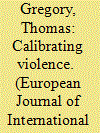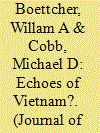| Srl | Item |
| 1 |
ID:
187148


|
|
|
|
|
| Summary/Abstract |
This article examines how coalition forces sought to weaponise the counting of civilian casualties in Afghanistan between 2008 and 2014. Drawing on interviews with senior coalition officials, recently declassified documents, and coalition data on civilian harm, it will explain how these figures were used to calibrate the violence inflicted on the Afghan people, ensuring that commanders applied sufficient force to achieve their objectives without causing unnecessary harm to civilians and jeopardising the success of military operations. The article examines the formation of the Civilian Casualty Tracking Cell (CCTC), which was created by General David McKiernan in 2008. It also traces the formation of the Civilian Casualty Mitigation Team (CCMT), which was established by General John Allen in 2011. Furthermore, it explores how this data was deployed by coalition officials to minimise civilian harm where possible and to rationalise this harm where necessary. Rather than simply documenting the death and destruction, these counts were complicit in the violence experienced by Afghan civilians, helping to enable and enhance the effectiveness of military operations. As such, I argue that these counts failed to contest the violence of war or the continued dehumanisation of Afghan civilians.
|
|
|
|
|
|
|
|
|
|
|
|
|
|
|
|
| 2 |
ID:
076112


|
|
|
| 3 |
ID:
145149


|
|
|
|
|
| Summary/Abstract |
What does taking dead bodies seriously tell us about the state of global security studies? Dead bodies play different roles in conventional, human, and critical security studies and thus thinking about them opens conversations among these different approaches. This paper pushes further to argue that scholars should think about the global dead as an analytical category. It demonstrates that doing so will allow us to rethink the measurement of war casualties, and examine the assumptions embedded in quantitative casualty data, the ethnography of these numbers, and the politics of representing them. Establishing the dead as an analytical category also widens the lens of dead body management to examine how dead bodies are not only objects but also subjects of security. This should lead us to ask about the politics behind how they are secured and governed, as well as the political and legal structures in place to manage them. Corpses matter for how we define security and they matter a great deal for a wide variety of security behavior. Up until now, security scholars have treated them implicitly but we can understand much more about the politics of the dead if we make them an explicit category of study.
|
|
|
|
|
|
|
|
|
|
|
|
|
|
|
|